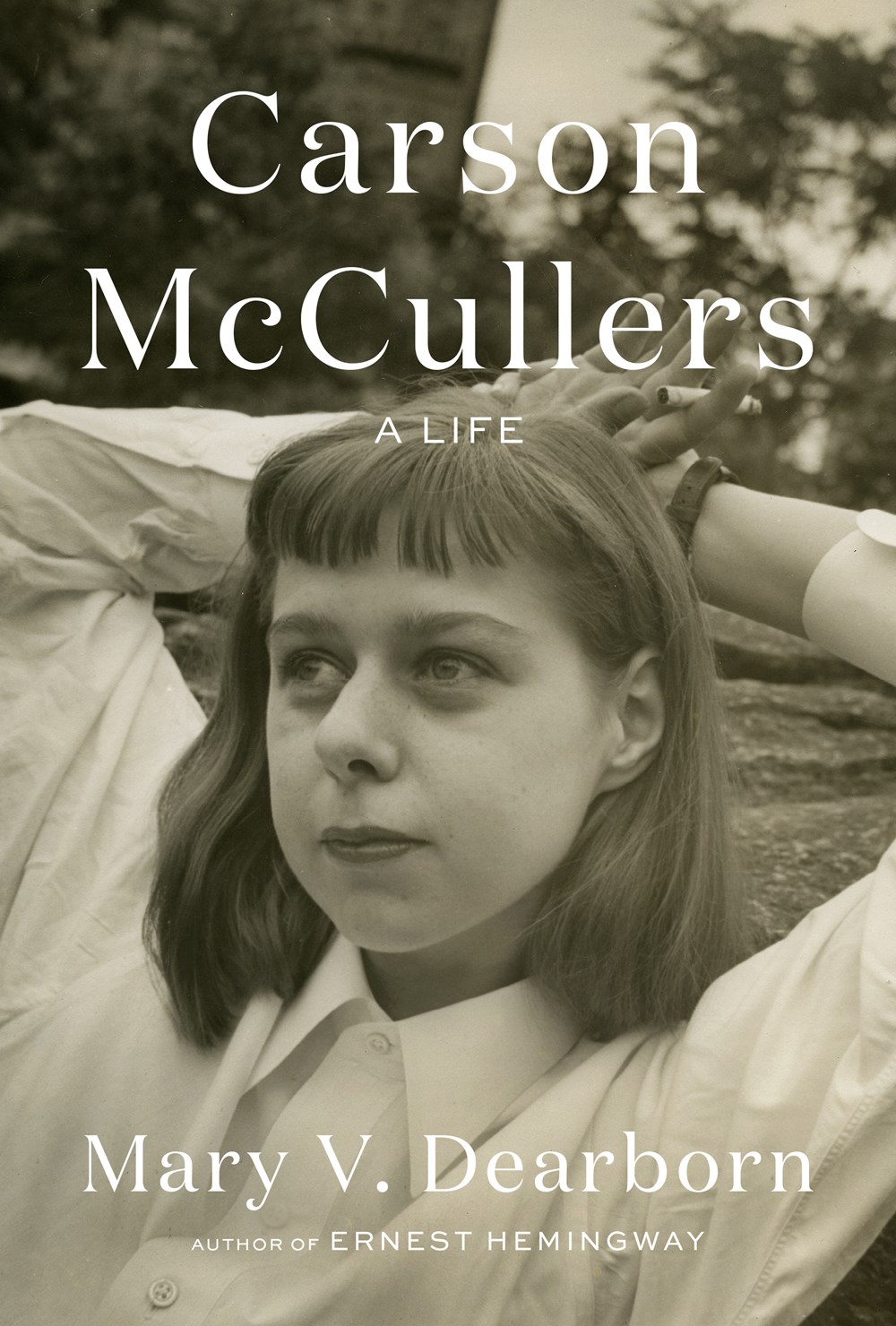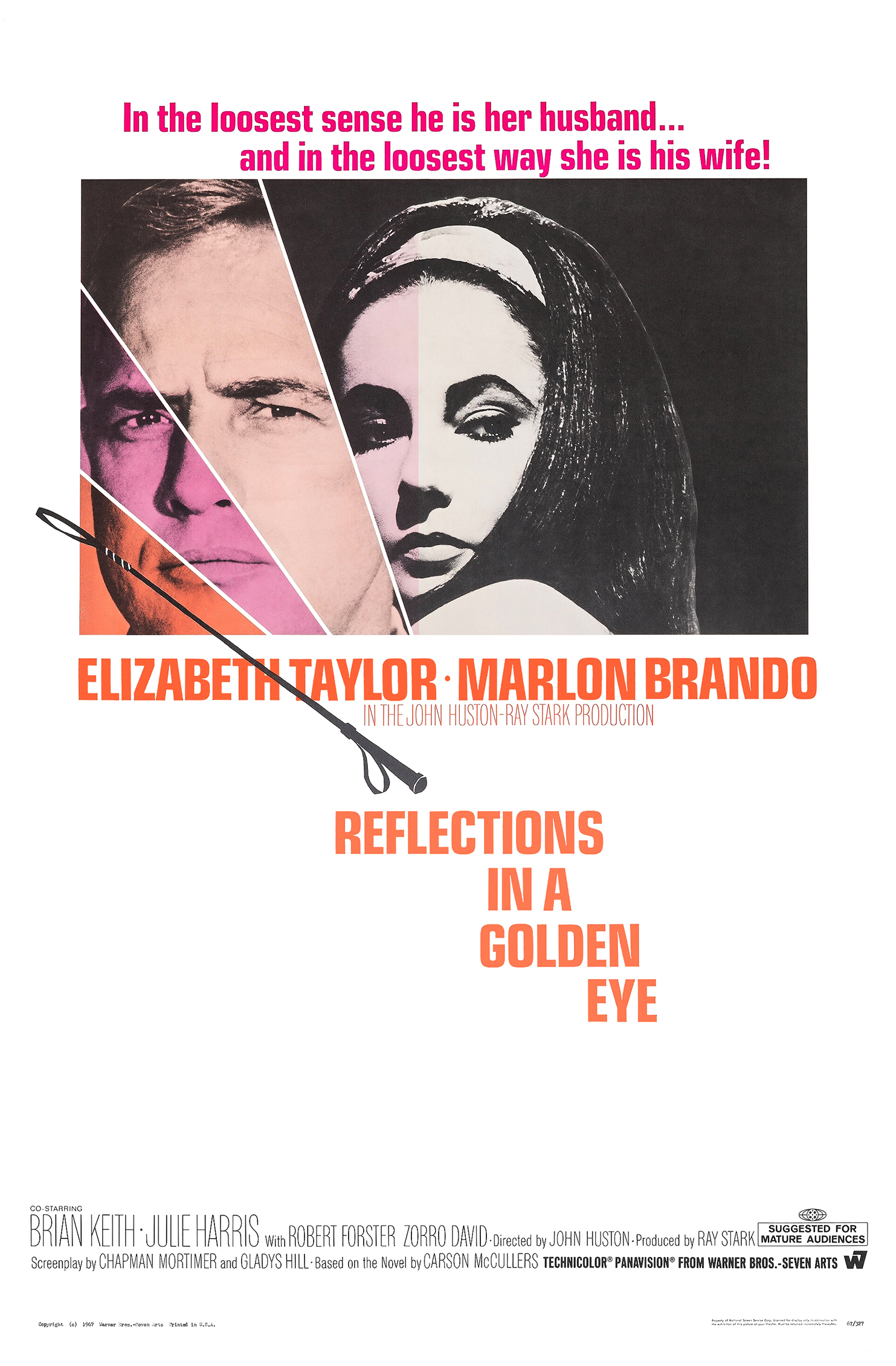REFLECTIONS
IN A GOLDEN EYE
35mm screening!
Friday, June
21 at 7 PM
In-Person:
Mary V. Dearborn, author of Carson McCullers: A Life
In conversation with film scholar Foster Hirsch & book editor/author Victoria Wilson
Movie only: $18
Public | $12 Members
Movie/Book
combo: $44 Public | $37 Members (Book retails for $40 in stores)
Join us for
a very special evening focusing on the life and work of legendary author Carson
McCullers, featuring a conversation with Mary V. Dearborn (author of the new
biography, Carson McCullers: A Life), in conversation with film scholar Foster
Hirsch, and her longtime Knopf editor, Victoria Wilson, and a 35mm screening of John Huston’s adaptation of Reflections in a
Golden Eye, starring Marlon Brando and Elizabeth Taylor.
Reflections
in a Golden Eye… “There
is a fort in the South where a few years ago a murder was committed.” So
begins John Huston’s mesmerizing adaptation of Carson McCullers’s Reflections
in a Golden Eye. Overflowing with gothic atmosphere, the film circles
around the stoic, marble-mouthed Major Weldon Penderton, a character rigorously
embodied by Marlon Brando. He silently pines for a mysterious young
soldier (Robert Forster, in his first screen role) who has secrets of
his own, like a fondness for naked horseback riding and a peculiar fixation
with the negligee of the Major’s wife, Leonora (Elizabeth Taylor, in a
performance so tempestuous it rivals her turn in Who’s Afraid of
Virginia Woolf?). Less inhibited is the neighbors’ houseboy Anacleto, a
fey, scene-stealing esthete who refuses to conform to the strictures of the
military environment that surrounds him, making him something of a rare bird in
this stirring examination of repressed longings and their unbearable weight. (USA,
1967, 108 min., color, 35mm)
Carson
McCullers: A Life is
the first major biography in more than twenty years of one of America’s
greatest writers, based on newly available letters and journals. V. S.
Pritchett called her “a genius.” Gore Vidal described her as a “beloved
novelist of singular brilliance . . . Of all the Southern writers, she is the
most apt to endure . . .” And Tennessee Williams said, “The
only real writer the South ever turned out, was Carson.” She was
born Lula Carson Smith in Columbus, Georgia. Her dream was to become a concert
pianist, though she’d been writing since she was sixteen and the influence of
music was evident throughout her work. As a child, she said she’d been “born a
man.” At twenty, she married Reeves McCullers, a fellow southerner, ex-soldier,
and aspiring writer (“He was the best-looking man I had ever seen”).
They had a fraught, tumultuous marriage lasting twelve years and ending with
his suicide in 1953. Reeves was devoted to her and to her writing, and he
envied her talent; she yearned for attention, mostly from women who admired her
but rebuffed her sexually. Her first novel—The Heart Is a Lonely Hunter—was
published in 1940, when she was twenty-three, and overnight, Carson
McCullers became the most widely talked about writer of the time. While
McCullers’s literary stature continues to endure, her private life has remained
enigmatic and largely unexamined. Now, with unprecedented access to the cache
of materials that has surfaced in the past decade, Mary Dearborn gives
us the first full picture of this brilliant, complex artist who was decades
ahead of her time, a writer who understood—and captured—the heart and longing
of the outcast.
“Now that Carson McCullers (1917-67) is a
figure of the past, a “classic” to be doled out to high-school and college
students, it’s invigorating to be reminded how she stunned the literary
world in 1940 with the publication of her first novel, “The Heart Is a
Lonely Hunter.” Eccentric, markedly androgynous, exotically Southern,
just 23 years old, she possessed talent of the first order and a stylistic
assurance that would have been remarkable even in a much older writer…. McCullers’s
life story is rife with drama, or perhaps one should say melodrama, and Ms.
Dearborn relates it all with real narrative skill; I found the book
hard to put down…. The even-handed Ms. Dearborn, though,
manages to strike a fine emotional balance, giving modern
readers insight into the reasons McCullers was able to create what may
be American literature’s most detailed, carefully observed picture of what it
means to be an outsider.” —Brooke Allen, Wall Street Journal


Mary V.
Dearborn is the
author of eight books, including biographies of Ernest Hemingway, Peggy
Guggenheim, Norman Mailer, and Louise Bryant. She received a
B.A. in English and Classics from Brown University and a Ph.D. in English and
Comparative Literature from Columbia University, where she was a Mellon Fellow
in the Humanities. She was most recently a fellow at the Dorothy and Lewis B.
Cullman Center for Scholars and Writers at the New York Public Library. She
lives in Buckland, Massachusetts. Her Carson McCullers: A Life was
published by Knopf in 2024.
Foster Hirsch, host of the
Cinema Arts Centre’s much beloved Film Noir series, is a
professor, film historian, and interviewer. He is a graduate of Stanford
University (class of 65) and received an M.F.A. in Film from Columbia
University and an M.F.A. and Ph.D. from Columbia in English. He joined the
Department of English at Brooklyn College in 1967 and moved over to the
college’s newly-formed Film Department in 1973 and has been there ever since.
Foster is the author of numerous books on both film and theater, including The
Dark Side of the Screen: Film Noir; Detours and Lost Highways: a
Map of Neo-Noir; The Hollywood Epic; Acting
Hollywood Style; A Method to Their Madness: the History of the
Actors Studio; Love, Sex, Death, and the Meaning of Life: the
Films of Woody Allen; Otto Preminger: The Man Who Would Be King;
Kurt Weill from Berlin To Broadway; Harold Prince and the
American Musical Theater; Laurence Olivier on Screen; Who’s
Afraid of Edward Albee?; Joseph Losey; George Kelly.
His newest book is Hollywood and the Movies of the Fifties: the Collapse
of the Studio System, the Thrill of Cinerama, and the Invasion of the Ultimate
Body Snatcher – Television.
Victoria Wilson, as Vice President, Executive
Editor at Alfred A. Knopf, in addition to publishing Mary Dearborn and Foster
Hirsch, has worked with many writers, among them: Anne Rice,
Lorrie Moore, Christopher Plummer, Billy Dee Williams, George Stevens, Suzanne
Simard, Wendy Wasserstein, Arthur Laurents, Lauren Bacall, Eve Babitz, Joe
Eillis, Rose Styron, Susan Cheever, Mary Beth Norton, Amy Klobuchar,
Laurie Colwin, Peter Beard, Diane Johnson, Mary
Ellen Mark, Jill Ciment, Sapphire, Jane Alexander, Jacques
d'Amboise, and Erin Brockovitch. After five decades
at Knopf, Wilson has left to write full time and to act as a consulting
editor. Her biography, A Life of Barbara Stanwyck: Steel-True
1907-1940 ( Simon and Schuster) was published to great acclaim (“Monumental.”
-- Peter Bogdanovich; “Huge and wonderful and rich. What an achievement!”—Anne
Rice; “860 glittering pages” -- Janet Maslin, The New York
Times). She is at work on the concluding volume of the Stanwyck
biography. Wilson has served on many boards and was appointed by
President Clinton to the US Commission on Civil Rights.